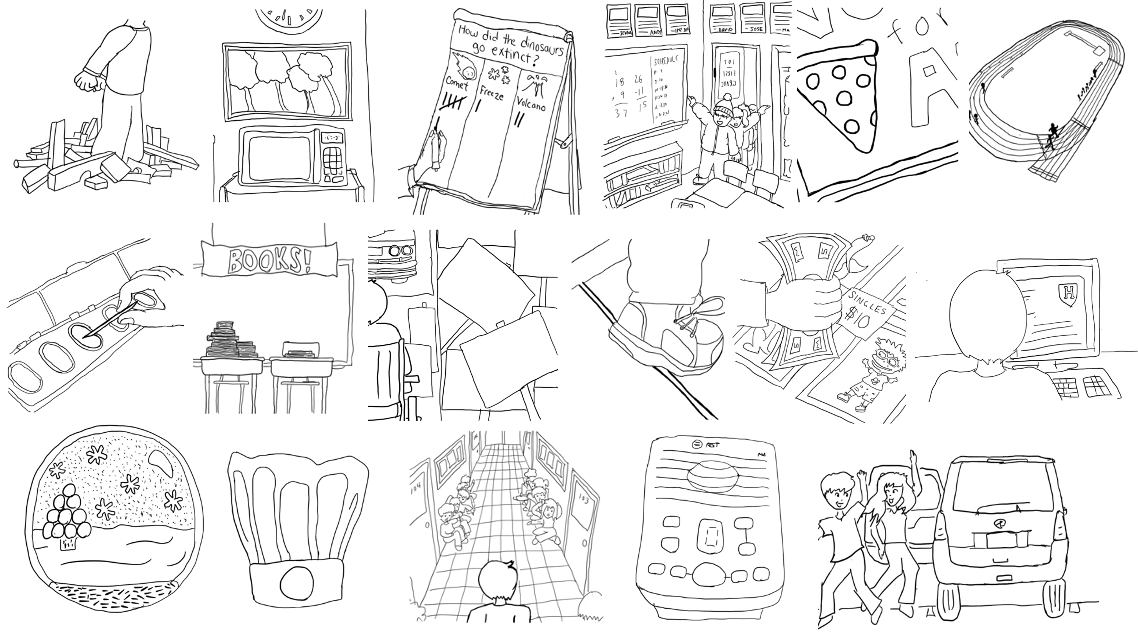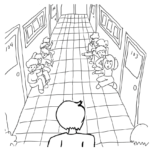There will be higher highs and lower lows than this.
Fourteen years after Ms. P says this, I sit at my desk in the Principal’s office. Moctar, a senior, stands next to me. He is the best person I know. He is kind without exception. He is curious about everything. He is diligent and conscientious and dedicated to his single mother.
At 6:00pm, he will hear back from MIT, his dream school. Many of his classmates have stayed to support him, lingering in my office and in the lobby outside. We are all rooting for him. No one deserves this more. We want it for Moctar, and in a way, we need it for ourselves, to believe that the universe is just. Moctar is that kind of person, the kind you watch closely, to see if the world will do right by him.
6:00pm arrives. Moctar slides into my chair and logs on to the MIT admissions portal. A few seconds pass. Then, animated confetti and balloons pop up on the screen. “Come on!” he shouts, and my office and the lobby erupt in jubilant chords. We hug. I’m sobbing. Through my tears, over Moctar’s shoulder, I see his best friend Michel, jumping up and down, all smiles, trying to get through the crowd. He can’t, because everyone is packed in, eager to congratulate Moctar on this epic and deserved accomplishment.
For me, this is, as Ms. P had prophesied, a higher high.
Moctar moves into the crowd to see his friends and to accept their hugs. I wipe away my own tears. I take stock of the scene. I remain elated.
After a minute, the elation shifts. I grow anxious, which is surprising. I look back at my computer screen, at the balloons and the confetti.
I’m anxious because I am, somewhere in my mind, imagining what this moment might have been, had MIT decided differently. Which they very well might have: I know there are a lot of special kids with broken hearts right now. I visualize Moctar among the broken-hearted. I worry about how he might have reacted, had he not gotten in, with his whole school watching. I wonder what rejection would have meant to him.
These are scary thoughts. I do not want Moctar to doubt, not ever, not even for an instant, how remarkable he is. He should not need MIT to know that, and he should never let MIT, nor any institution, nor any individual, call that into question.
I feel the same for his fellow seniors, all of whom I am close to. They are a small group, the charter school network’s founding cohort. For three years, we have built their high school from scratch, together, alongside their wonderful teachers. It has been a tough gig, full of insufficiencies and mistakes that I take to bed each night and wake up with each morning. But it has been wonderful, too, largely because of them, these smart and spunky and sweeter-than-they-let-on teens.
We escape the week. They get in everywhere. Crowds gather, emails open, cheers erupt, we celebrate. Barnard, Emory, Tufts. In, In, In.
My joy is real. My pride, too. But my anxiety and regret are also real. I’ve made another mistake, I realize. I’ve given these colleges – this whole thing – too much meaning.
Finally, all these years later, I understand my English teachers’ lesson. Not just logically, but viscerally. Their lesson is caught in my chest. It’s coursing through my veins. Now that I have students of my own, I understand.
I want to tell my students exactly what Ms. P told us that morning, when she instructed us to put Hardy aside:
There will be higher highs and lower lows than this.
I look out at my students, and I worry, as my English teachers once did. I am proud that they are going to college. But I hope they know I would be as proud, and I would love them as fully, even if they weren’t. Have I made that known to them? Beyond all doubt?
Now that I have spent hours with them, building lists and revising personal statements and practicing interviews, crying and cheering at their acceptances, I want to teach them something different. I want to teach them that while college is kind of important, it’s in no way as important as I thought it was, at their age. Harvard was great, but it was not a dream. It did not change or shape my life as much as I thought it would. Years later, I can say that many things have mattered much more: the jobs I’ve chosen, the places I’ve lived, the people I’ve met and loved.
Some people will say I’m wrong. They will say I forget: college is even more important to my students, because they are black from Harlem, and I am white from Long Island. They need it more; it will mean more to their families.
But I don’t forget. I remember. I remember what Harvard was, and more importantly, what Harvard was not. I know I am white from Long Island. I know that that school was built for me. And I remember how I struggled anyway: to feel comfortable there, to locate confidence there, to find value there, to take risks there. To keep the highs and lows in perspective. To feel that I was enough.
Beyond a college degree, I want for my students to always feel that they are enough. I want them to feel, for themselves, the love and the confidence that I feel for them. I worry that their time in school has not fully prepared them for this. They will go to college, but once there, will their love and confidence flourish? Will they keep the highs and lows in perspective? Will they fortify themselves against any institution, against any individual, who might cause them doubt.
I want their education to have prepared them in this way. But I am not sure that it has.
I spend the spring semester trying to make up for it. I tell my students, in all the ways I can imagine, that there will be higher highs and lower lows than this. I tell them that, throughout all those highs and lows, they will always be wonderful and deserving, whatever their degrees. I beg them please, please, to not forget it.
I teach this lesson earnestly. I want so badly for them to understand. They may or may not be ready. But as their teacher, and because I love them, I have to try.
As I try, something curious happens. I teach the lesson so earnestly that I become a student of it myself. Now in my thirties, I begin to reconsider my own highs and lows. I think about the status and nature of my own self-love. I wonder about the lessons I have learned, and the ones that I haven’t.
I write about these lessons. As I write about them, I think of my students, past and future; and I think about students I’ll never meet, but who I care about anyway, in that weird, wonderful way that educators do.
Like my own students, I want for you to know that you are enough. It’s not really my place to tell you that, or even to want that for you. But I do, anyway. And I want to share with you the lessons that got me to this point – the lessons that really mattered. These lessons, I’ve found, are the ones that move us, sometimes forward, sometimes backward, on that journey of discovering and accepting who we are. I don’t have much to do with your journey. But I bet that it is, like mine, funny and sad, simple and complicated, very familiar, yet very hard to figure out.
I know that sometimes, while you’re in classrooms, you spend a lot of time talking about tangential things, like… well, tangent lines, or ancient history, or The Great Gatsby. So I thought maybe I’d write this, as an educator, confessing to you what you already know: that while a little bit of your education is in those lessons, a lot more of it is in the lessons taking shape around your classrooms and books and transcripts. These lessons vary in shape and size. These lessons are more often accidental than planned. These lessons show you a piece of who you really are, or a glimpse of who you are becoming: a fighter, a (toothpick) artist, a shopkeeper, a poor-rich kid, a rich-poor kid, the Pillsbury Doughboy, a failed vice-president, an aspiring Freedom Rider, a white kid who doesn’t know he’s white, a skinny boy who misses being fat, a confident dancer, a terrified social anthropologist. A teacher. Maybe even a writer.
Good lessons are not always easy to recognize. But they have this in common, I think: they beg to be shared. They whisper that they are not meant for you alone, even if they feel very wrapped up in your own life and person. Good lessons want to escape, to get out in the world, through essays or songs or casual conversations on Saturday afternoons. Good lessons know that we are teachers and learners, all of us; and that good lessons turn great when we teach and learn them together.



